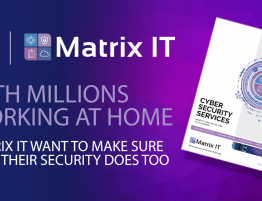
Let’s set the scene. It’s 2021, and much like 2020, the majority of the UK’s office-based workforce is working remotely. This dispersal of people and endpoints makes keeping track of and protecting logins to your IT hardware and cloud-based systems almost impossible without the help of a firewall.
Cyber attacks are on the rise, fuelled by the increase in homeworking and the vulnerabilities and gaps in security this exploits. So whether your remote workers are logging into servers and systems housed physically in your workplace, or cloud systems, are you sure that your firewall is protecting you from external threats?
What Does A Firewall Do?
A firewall is a security device – either hardware or software – that protects your network by monitoring incoming and outgoing traffic and deciding whether to allow or block it. A firewall is your gatekeeper, working as a barrier between your secure and controlled internal systems and outside networks that might be untrustworthy. At a time when workforces are dispersed and endpoints may not be as secure as you would like with people often using home devices, firewalls are more important than ever.
How Does A Firewall Work?
Firewalls decide whether to allow or block traffic based on a set of predefined rules. They have to be configured to accept incoming connections, by recognising IP addresses for example. An Internet Protocol (IP) address is basically the digital address of a device – for example a computer – that allows it to be recognised. This IP address creates an electronic return address for all your online activity.
Firewalls can then be configured to trust traffic from recognised IP addresses – such as your company’s internal IP addresses or the IP addresses of people working from home. When working from home, your IP address will be set by your Internet Service Provider (ISP). However, problems can occur when people have variable instead of fixed IP addresses provided as part of their internet package, as then firewalls may not recognise all the connections from their devices.
Hardware Or Software?
You can either have a hardware firewall – this is a physical device that is stored between your network and gateway and will be most likely found at your premises if you have IT networks internally. Or, a software firewall which is an internal programme on your computer.
There are also cloud-based varieties that can grow with your organisation and next generation firewalls which have been designed to work effectively in a world with dispersed workforces, the Internet of Things and the modern challenges these bring to businesses.
Managed Firewall Services
At Matrix IT, our security experts are ready to advise you on the implementation of firewalls to protect your business and its data from intrusion, malware and DDos attacks. Our managed firewall services ensure your business is always protected and because they are centrally managed, we can respond to any issues, upgrade to the latest firmware and spot any potential attacks.
To protect your networks from insecure remote logins and untrustworthy traffic speak to the Matrix IT team today on 44 (0)1329 888 444 or click here to find out more about our managed firewall services.









